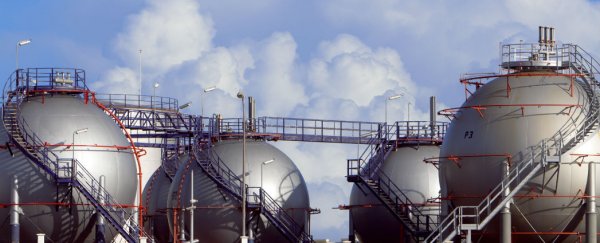Californians are about to get their water from a new source - the Pacific Ocean, as Governor Jerry Brown's new plan to save the state is set to launch next year. The governor passed mandatory water conservation restrictions this past April in a massive effort to cut water usage, but critics have warned that mere conservation will not be enough to save the state's severe water shortage.
California is experiencing the worst drought in its history, and according Jay Famiglietti, senior water scientist at the NASA Jet Propulsion Laboratory, the state only has about one year of water left in storage. "As our 'wet' season draws to a close, it is clear that the paltry rain and snowfall have done almost nothing to alleviate epic drought conditions," he wrote in op-ed earlier this year for The Los Angeles Times. "January was the driest in California since record-keeping began in 1895. Groundwater and snowpack levels are at all-time lows. We're not just up a creek without a paddle in California, we're losing the creek too."
So the governor is kicking his new plan into action. With several ocean desalination plants already up and running in a handful of towns around the state, a new and much larger plant is now underway. The new plant in Huntington Beach would supply water to the heavily populated Orange County region.
The Huntington Beach plant would be the biggest in the western hemisphere and would produce 189 million litres (50 million gallons) of drinking water a year. The downside is that in for every 2 litres of water that go in, only 1 will come out, and the leftover super-salty brine would mix in with the city's wastewater before being piped back out to sea to spread around, about 50 km offshore. And this salty brine, along with financial concerns, have environmentalists questioning the governor's plan.
"The biggest concern about desalination is that it is expensive, it's energy-intensive and it has a lot of side effects - a lot of unintended consequences to marine life both from the intake and the discharge," Marco Gonzalez, the executive director of the US Coastal Environmental Rights Foundation, told NPR News.
The company developing the new plant, Poseidon Water, has insisted it will counter the environmental damage by contributing financially to a Californian program that funds projects aimed at offsetting emissions of greenhouse gases.
Conservationists believe water desalination should be the state's last resort, and more focus should be put on water conservation efforts around the state, but not everyone agrees. "I don't think we can really conserve our way out of this problem, this problem being a combination of drought and of incredibly high water demand by a growing population and climate change," Famiglietti told NPR News.
Yet the smaller plants in the state have proven themselves effective, and other US states such as Florida already have their own plants up and running, and are now looking to build more. With what may well be only a year of fresh water left and a ticking clock, the ocean may well be California's very last resort.
